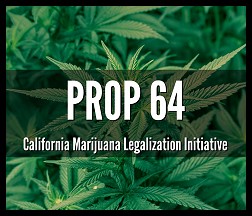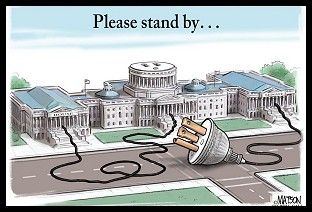 Irrespective of whether a citizen favors or opposes adult recreational marijuana consumption, a "yes" vote on California's Proposition 64, the Marijuana Legalization Initiative, is a no-brainer.
Irrespective of whether a citizen favors or opposes adult recreational marijuana consumption, a "yes" vote on California's Proposition 64, the Marijuana Legalization Initiative, is a no-brainer.
The measure would legalize possession and use for adults 21 and older, create a new Bureau of Marijuana Control charged with the regulation and licensing of non-medical marijuana businesses, permit cities and counties to require licenses and restrict the locations of marijuana businesses, and provide for taxation on both cultivation and sales. As is the case with alcohol, there is nothing in the measure that would prevent criminal penalties for driving under the influence.
Setting aside the well-documented history of complicity in the global drug trade both by U.S. covert agencies and by the global banking industry, the plain and simple fact is that prohibition, whether applied to alcohol or to other "narcotics" has, at best, repeatedly proven to be an inordinately expensive abject failure that is destructive of the lives of those who partake of the forbidden fruit and, all too often, has a devastating impact upon their families and finances...
Futility of prohibition
"Over the last 40 years, more than 45 million drug-related arrests have cost an estimated one trillion dollars," Amy Goodman reported in 2012 on Democracy Now! "Yet drugs are cheaper, purer and more available today than ever."
Reality is counter-intuitive. Prohibition produces an "increase" in narcotics consumption --- a point illustrated by Portugal, whose decades-long experiment in the decriminalization of all narcotics produced a 50% reduction in drug abuse.
Prohibition is not merely counter-productive but costly. A study by researcher Jon Gettman, Ph.D., estimated a $43 billion annual cost in controlling the least dangerous of the "controlled substances" --- marijuana. The $43 billion was broken down, according to the study, as "$10.7 billion in direct law enforcement costs, and $31.1 billion in lost tax revenues."
In California, these drug war expenditures have adversely affected other areas of public service. Where, in 1980, 10% of California's state budget was devoted to higher education and only 3% to prisons, by "2010, almost 11 percent went to prisons and only 7.5 percent to higher education."
The federal government not only ignored but defied science when it classified marijuana as a Class I narcotic. That classification should only be applied to substances, like heroin, that have no currently accepted medical use and a high potential for abuse. As Michael Collins, Deputy Director for the Drug Policy Alliance's Office of National Affairs in Washington D.C. noted on a recent BradCast, even cocaine is classified only as Schedule II.
Unlike cocaine, as long ago discussed by Yale Law Prof. Steven B. Duke and attorney Albert Gross in America's Longest War: Rethinking Our Tragic Crusade Against Drugs (1994), marijuana is neither addictive nor "criminogenic." From a pharmacological perspective, it is not a "gateway drug." Use doesn't lead to consumption of other drugs. Prohibition, by contrast, is a gateway, in and of itself, because users come into contact with dangerous "criminal suppliers" who engage in the trafficking of other more harmful "illicit" drugs. While there are no documented cases in which a life has been lost as a direct result of marijuana consumption, prohibition renders buyers vulnerable to predatory crime when their desire to obtain the relatively innocuous elixir leads them to venture into high crime areas and into buying from dangerous criminal suppliers.
Duke & Gross's conclusions are backed up by recent studies. Marijuana is less harmful than certain legal substances like alcohol and tobacco. Indeed, on Aug. 26, 2014, the Los Angeles Times pointed to a study released by the Journal of the American Medical Association (JAMA) which reinforced long-established findings on the benefits of medical marijuana for pain relief and amelioration of other symptoms associated with such medical disorders as cancer. The JAMA study also found that there was, on average, a 33% reduction in prescription "opiate-related overdoses" and a corresponding reduction in opiate-related deaths "six years after [California's] medical marijuana laws took effect."
Yet, according to a newly released Human Rights Watch report, in 2015 more people were arrested across the nation for possession of marijuana than for murder, manslaughter, rape, robbery and assault combined.
Cynical Drug War
There is a substantial body of academic work, such as Peter Dale Scott's Drugs, Oil and War that document both the extent to which the illicit narcotics trade serves to fund the operations carried out by the CIA and other covert agencies. Their covert activities are carried out on behalf of the U.S.-based corporate global empire. Indeed, as it relates to international trafficking, it is Scott's core thesis that the purpose behind our selectively enforced "war on drugs" lies in the ability of empire's covert agencies through on-again off-again alliances with drug cartels to maintain monopoly control of the trade.
Illicitly laundered drug monies have become so deeply embedded within the global banking system that, according to Antonio Maria Costa, the head of the U.N. Office on Drugs and Crime, those illicit funds were the only thing that kept several banks afloat during the 2008 financial meltdown.
It is the domestic implications of the "war on drugs," however, that are especially pertinent when it comes to the beneficial impact of Prop 64 in California.
America, supposedly the Land of the Free, maintains the world's largest per capita prison population. While the U.S. accounts for only 5% of the world's people, it maintains more than 20% of the world's prison population. Prisons have become a multi-billion industry --- one which has, as observed by CNBC, produced the "stunning" fact that "one out of [every] 32 [Americans] is on probation, parole or in prison." More than "one half of 2.3 million [U.S. prison] inmates are serving time for drug-related offenses."
We've erected a Prison Industrial Complex that operates on two perverse financial incentives: (1) private for-profit prisons and (2) a vast pool of prison slave labor --- labor that is exploited by the same multi-national corporations that previously outsourced much of the U.S. manufacturing base in search of cheap foreign labor. Financial success is dependent upon greater numbers of prisoners serving lengthier sentences, and in the size of today's slave labor pool. Disproportionately that slave labor pool includes the descendants of African-American slaves. Five "times as many Whites are using drugs as African Americans, yet African Americans are sent to prison for drug offenses at 10 times the rate of Whites," according to the NAACP.
Critical First Step
While Prop 64 will not end our irrational "war on drugs," it does provide a critical first step. Not only would it likely produce significant financial savings by curtailing arrests and incarceration, but it is also likely to enhance state revenues for vital public services, such as education. (In 2015, Colorado "collected more than $135 million marijuana taxes and fees...more than $35 million of which is earmarked for school construction projects.")
Legalization actually serves the interest of public safety. As we previously reported Mexican drug cartel violence has spilled over into the United States. By legalizing marijuana, California will cut-away 40% of the cartel profits, thereby producing a significant drop in the flow of illicit drugs from Mexico into California and, with it, a drop in spillover violence.
There is every reason to vote "Yes" on Prop 64; no valid reason to vote "No."
Ernest A. Canning is a retired attorney, author, Vietnam Veteran (4th Infantry, Central Highlands 1968) and a Senior Advisor to Veterans For Bernie. He has been a member of the California state bar since 1977. In addition to a juris doctor, he has received both undergraduate and graduate degrees in political science. Follow him on twitter: @cann4ing


 Trump Labor Dept. Warns Trump Policies Sparking Food Shortage, Farmworker Crisis: 'BradCast' 10/9/25
Trump Labor Dept. Warns Trump Policies Sparking Food Shortage, Farmworker Crisis: 'BradCast' 10/9/25 'Green News Report' 10/9/25
'Green News Report' 10/9/25
 Trump's Losing Battles: 'BradCast' 10/8/25
Trump's Losing Battles: 'BradCast' 10/8/25 'Supreme Arrogance': Trump, John Roberts and His Stacked, Packed and Captured SCOTUS: 'BradCast' 10/7/25
'Supreme Arrogance': Trump, John Roberts and His Stacked, Packed and Captured SCOTUS: 'BradCast' 10/7/25 'Green News Report' 10/7/25
'Green News Report' 10/7/25 Trump Attempting His
Trump Attempting His Sunday 'Shutshow' Toons
Sunday 'Shutshow' Toons Biden Budget Expert: Mass Firings in Shutdown 'Extremely Illegal': 'BradCast' 10/2/25
Biden Budget Expert: Mass Firings in Shutdown 'Extremely Illegal': 'BradCast' 10/2/25 'Green News Report' 10/2/25
'Green News Report' 10/2/25 Why is DOJ Suing 'Blue' States for Their Voter Databases?: 'BradCast' 10/1/25
Why is DOJ Suing 'Blue' States for Their Voter Databases?: 'BradCast' 10/1/25 'A War from Within' Trump's Twisted Mind: 'BradCast' 9/30/25
'A War from Within' Trump's Twisted Mind: 'BradCast' 9/30/25 'Green News Report' 9/30/25
'Green News Report' 9/30/25 'Fear is the Tool of a Tyrant':
'Fear is the Tool of a Tyrant': Sunday 'Long Arm/Small Man' Toons
Sunday 'Long Arm/Small Man' Toons 'Green News Report' 9/25/25
'Green News Report' 9/25/25 I Don't Know What This Means, But I Thought You Should Know: 'BradCast' 9/25/25
I Don't Know What This Means, But I Thought You Should Know: 'BradCast' 9/25/25 Gov't Shutdown Looms as Dems Fight to Save Healthcare Subsidies: 'BradCast' 9/24/25
Gov't Shutdown Looms as Dems Fight to Save Healthcare Subsidies: 'BradCast' 9/24/25 Updates: Homan Bribery; Kimmel Censorship; Our Insane Prez at U.N.: 'BradCast' 9/23/25
Updates: Homan Bribery; Kimmel Censorship; Our Insane Prez at U.N.: 'BradCast' 9/23/25 Trump 'Border Czar' Took $50k in Sting, DOJ Dropped the Case: 'BradCast' 9/22/25
Trump 'Border Czar' Took $50k in Sting, DOJ Dropped the Case: 'BradCast' 9/22/25 MAGA Exploiting Kirk's Death as Their 9/11: 'BradCast' 9/17/25
MAGA Exploiting Kirk's Death as Their 9/11: 'BradCast' 9/17/25 Our Crumbling Courts and Withering Rule of Law: 'BradCast' 9/16/25
Our Crumbling Courts and Withering Rule of Law: 'BradCast' 9/16/25 After Kirk Murder, 1st Amendment, Not 2nd, Under Attack: 'BradCast' 9/15/25
After Kirk Murder, 1st Amendment, Not 2nd, Under Attack: 'BradCast' 9/15/25 SCOTUS Suspension of 4th Amendment an Ominous Threat to Constitutional Republic
SCOTUS Suspension of 4th Amendment an Ominous Threat to Constitutional Republic
 VA GOP VOTER REG FRAUDSTER OFF HOOK
VA GOP VOTER REG FRAUDSTER OFF HOOK Criminal GOP Voter Registration Fraud Probe Expanding in VA
Criminal GOP Voter Registration Fraud Probe Expanding in VA DOJ PROBE SOUGHT AFTER VA ARREST
DOJ PROBE SOUGHT AFTER VA ARREST Arrest in VA: GOP Voter Reg Scandal Widens
Arrest in VA: GOP Voter Reg Scandal Widens ALL TOGETHER: ROVE, SPROUL, KOCHS, RNC
ALL TOGETHER: ROVE, SPROUL, KOCHS, RNC LATimes: RNC's 'Fired' Sproul Working for Repubs in 'as Many as 30 States'
LATimes: RNC's 'Fired' Sproul Working for Repubs in 'as Many as 30 States' 'Fired' Sproul Group 'Cloned', Still Working for Republicans in At Least 10 States
'Fired' Sproul Group 'Cloned', Still Working for Republicans in At Least 10 States FINALLY: FOX ON GOP REG FRAUD SCANDAL
FINALLY: FOX ON GOP REG FRAUD SCANDAL COLORADO FOLLOWS FLORIDA WITH GOP CRIMINAL INVESTIGATION
COLORADO FOLLOWS FLORIDA WITH GOP CRIMINAL INVESTIGATION CRIMINAL PROBE LAUNCHED INTO GOP VOTER REGISTRATION FRAUD SCANDAL IN FL
CRIMINAL PROBE LAUNCHED INTO GOP VOTER REGISTRATION FRAUD SCANDAL IN FL Brad Breaks PA Photo ID & GOP Registration Fraud Scandal News on Hartmann TV
Brad Breaks PA Photo ID & GOP Registration Fraud Scandal News on Hartmann TV  CAUGHT ON TAPE: COORDINATED NATIONWIDE GOP VOTER REG SCAM
CAUGHT ON TAPE: COORDINATED NATIONWIDE GOP VOTER REG SCAM CRIMINAL ELECTION FRAUD COMPLAINT FILED AGAINST GOP 'FRAUD' FIRM
CRIMINAL ELECTION FRAUD COMPLAINT FILED AGAINST GOP 'FRAUD' FIRM RICK SCOTT GETS ROLLED IN GOP REGISTRATION FRAUD SCANDAL
RICK SCOTT GETS ROLLED IN GOP REGISTRATION FRAUD SCANDAL VIDEO: Brad Breaks GOP Reg Fraud Scandal on Hartmann TV
VIDEO: Brad Breaks GOP Reg Fraud Scandal on Hartmann TV RNC FIRES NATIONAL VOTER REGISTRATION FIRM FOR FRAUD
RNC FIRES NATIONAL VOTER REGISTRATION FIRM FOR FRAUD EXCLUSIVE: Intvw w/ FL Official Who First Discovered GOP Reg Fraud
EXCLUSIVE: Intvw w/ FL Official Who First Discovered GOP Reg Fraud GOP REGISTRATION FRAUD FOUND IN FL
GOP REGISTRATION FRAUD FOUND IN FL

































